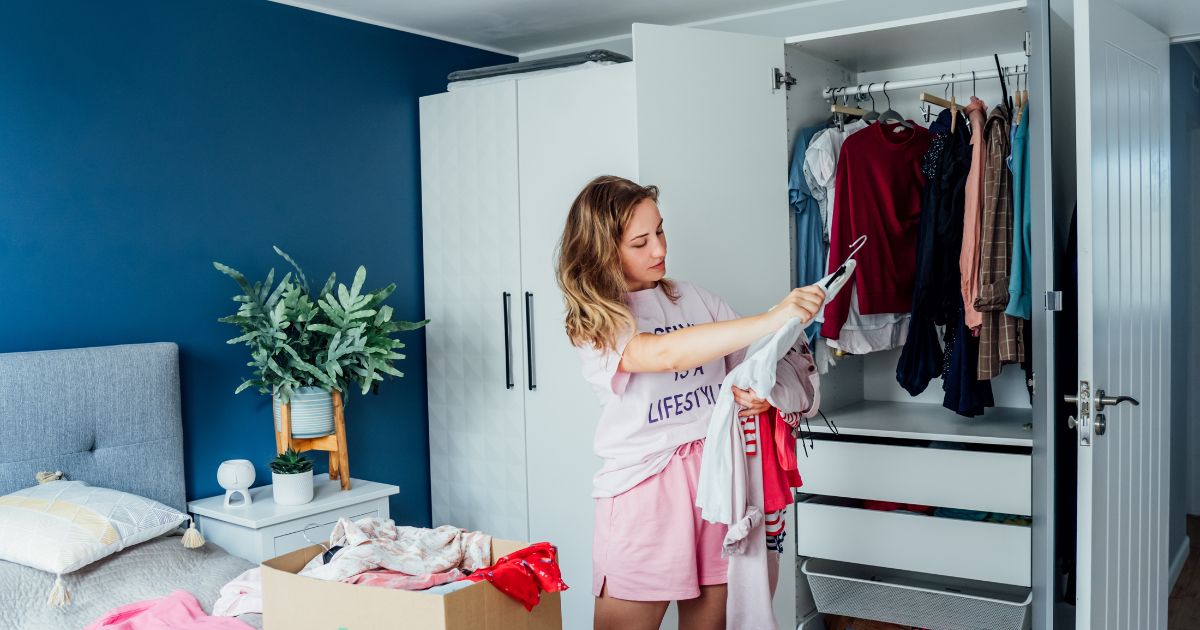 Minimalism is more than just a fleeting social media trend. It’s a way of life that emphasizes owning only what you need. This approach extends beyond decluttering your home to simplifying your entire life. Although it can be a challenging process, it's important to remember that minimalism is about prioritization rather than sacrifice. When you embrace a minimalist lifestyle, you focus on keeping only the people, things, events, and goals that truly bring you joy. It can also help you save money. The following principles can help you transition to a minimalist lifestyle.
Minimalism is more than just a fleeting social media trend. It’s a way of life that emphasizes owning only what you need. This approach extends beyond decluttering your home to simplifying your entire life. Although it can be a challenging process, it's important to remember that minimalism is about prioritization rather than sacrifice. When you embrace a minimalist lifestyle, you focus on keeping only the people, things, events, and goals that truly bring you joy. It can also help you save money. The following principles can help you transition to a minimalist lifestyle.
1. Keep your spaces clutter-free
One of the first things you should do when embracing minimalism is to declutter your space. The more material possessions you have, the more stress you'll have when it comes to managing and organizing them. If you're feeling overwhelmed by the clutter, tackle it one room at a time. You can start by focusing on the rooms you spend the most time in, like your living room or bedroom.
Designate piles or bins to utilize as you sort your belongings. Categories such as keep, donate, fix, or discard can help you classify your stuff. Additionally, limit the items you store on flat surfaces, like kitchen counters, desks, or nightstands. This can help you determine if you have more possessions than physical space available for them. In your minimalist home, a tidy and organized environment can help you achieve a sense of peacefulness and clarity.
2. Prioritize quality over quantity
Another crucial aspect of minimalist living is prioritizing quality over quantity. This means that, in general, having a few high-quality items is better than having many low-quality items. For instance, you might have purchased a backpack because it was the cheapest option. However, you’ll likely have to replace it sooner than a backpack made from quality materials. Instead, you should spend a little extra on a book bag that’s built to last. The quality-over-quantity rule will save you time and money on shopping. Plus, you’ll create less waste over time by purchasing fewer replacement items.
Furthermore, this principle extends beyond material possessions and can be applied to various aspects of life. For example, you may feel more fulfilled when you focus your energy on a few close friends rather than a dozen acquaintances. You can also aim for quality over quantity in the experiences, projects, and hobbies in your life.
3. Create a capsule wardrobe
A capsule wardrobe is a curated collection of clothing that can be mixed and matched to create many outfits. The key is to select timeless and durable pieces that can be worn year after year. With this wardrobe, you’ll likely spend less time deciding what to wear since your options will be limited and more intentional. Plus, you’ll have more space in your closet. You can start by getting rid of articles that have served their purpose. Clothes that don’t fit well, are not your style, or are similar to items you already own can be donated or sold.
Once you've cleared out the clutter, you can begin curating your capsule wardrobe. It might take a little bit of experimentation to find your personal style within a structured closet. Yet, you can gradually add pieces over time by thrifting or shopping clearance sales. Start with the basics, such as a white button-up shirt, a pair of dark-wash jeans, and a classic blazer or jacket. From there, add a few statement pieces that reflect your style and can be paired with the basics. Don't forget to consider the climate and your daily activities when selecting items for your capsule wardrobe.
4. Delete digital clutter
When you're feeling overwhelmed by physical clutter, it's tempting to reach for your phone or laptop as a distraction. However, digital messes can be just as overwhelming. To begin clearing your digital clutter, unsubscribe from emails, and tidy up your inbox. Delete phone applications or old computer files you don’t use.
Digital clutter may not be as apparent as physical clutter, but it can still cause stress and waste your valuable time. To keep your devices organized, take time once a month to delete stuff you don’t need. Delete or archive any excess photos, unused bookmarks, and any files or emails you haven't accessed in the last 90 days. Backing up your files and emails will ensure they are easily searchable on your desktop or in your inbox without the clutter.
5. Identify your goals and priorities
Another important part of living a minimalist lifestyle is setting clear goals and priorities for your life. When you have a goal to focus on, you can direct your time, energy, and resources towards that objective. Essentially, you’ll be more efficient and spend less time worrying about distractions. Creating personal, career, relationship, or financial goals can give you a sense of purpose and direction.
Setting goals can declutter mental and emotional space as well. With less stress on your mind, you could experience increased creativity, productivity, and overall well-being. Whether you have a goal to pursue a meaningful career, nurture strong relationships, or prioritize personal growth, minimalism can help you stay on track and live a fulfilling life.
6. Think before you buy
While decluttering is crucial, it’s important to be mindful of what you acquire in the future. Before purchasing anything, online or in-store, take a moment to reflect on whether it adds value to your life. This simple pause before hitting "Add to Cart" can help you save money on impulse buys and lead to a more intentional life. Creating a minimalist budget can help you cut out items that don’t align with your interests and goals.
By considering the necessity of each item before you buy, you can make more deliberate choices and reduce clutter. This approach can assist you in avoiding lifestyle creep, as each of your belongings serve a meaningful role. Minimalism is not just about decluttering your life, but also about making conscious decisions about what you invite in. In the end, each addition to your life must be a valuable and mindful decision.
7. Be intentional with your time
When you decline opportunities or requests that don't align with your values or goals, you make room for things that are truly important. Prioritizing your time and energy can help you overcome procrastination and focus on the tasks that make you happy. This can lead to a more fulfilling and purposeful life. Saying no, however, can be challenging. Nonetheless, it’s sometimes necessary for your well-being.
It's also essential to communicate your boundaries clearly and respectfully, even if it's uncomfortable. For instance, a friend might have invited you to go mini-golfing, but you've already signed up to volunteer for a local event in your community. Even though you value your friendship, it's okay to decline the invitation to fulfill your commitment as a volunteer. By protecting your time and energy, you create space for the things that matter most in your life.
8. Practice gratitude
When living simply, gratitude and minimalism go hand in hand. Appreciating what you have can reduce the desire for more. Buying stuff rarely brings lasting happiness, and experiences often bring more fulfillment. Cultivating gratitude and minimalism can be achieved through simple exercises, such as keeping a gratitude journal, taking a mindfulness walk, or snapping a daily photo of something you’re thankful for. By focusing on what you have, you can find greater happiness in the present moment.
It's easy to get caught up in societal pressure to achieve the next big milestone or accumulate more possessions. By taking a step back and recognizing the good in your life, you can shift your perspective to find happiness in the simple things. Take the time to appreciate the people and things you’re thankful for, such as your family, a good night’s sleep, your health, a movie that always makes you laugh, a trusted mentor, or the sunset. Pausing to practice gratitude for where you’re at now doesn't mean you can't ever strive for more or set goals for the future. Gratitude just helps you appreciate the journey and feel fulfilled along the way.
Practicing minimalism is about simplifying your lifestyle and focusing on what truly matters. When you set your sights on being a minimalist, you can enjoy a fuller wallet, better mental and physical health, and less stress. Though creating a minimalist mindset is a personal journey; there's no one-size-fits-all approach. You can modify these principles to fit into your life and strive for a simpler, more intentional way of life.
WHAT'S NEXT?🙅As you simplify your life, others might be tempted to compare. Read How to Avoid Financial Peer Pressure in College. 🏖️Experiences often bring more lasting happiness than stuff. Check out How to Save for a Vacation to start putting money towards your next experience. |









.jpg)
.jpg)



